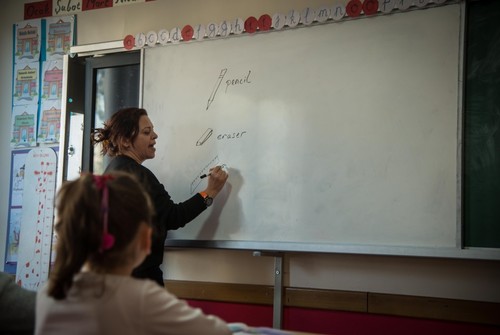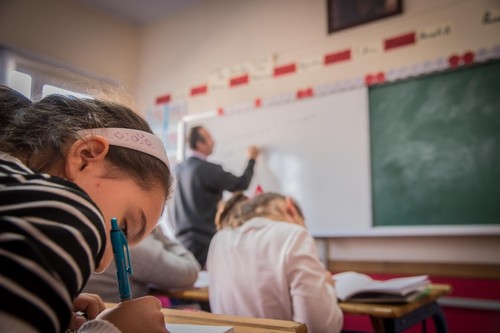© Turkuvaz Haberleşme ve Yayıncılık 2026
The recent hit-single of Turkish teenage singer Aleyna Tilki plays in lieu of the break-time bell as it marks the end of another class for some 50 Turkish students at the Turkish Embassy Tahran Primary School. Children hurriedly exit the building in the 10-minute break just to run around in a tightly limited space as the school is located inside the compound of the Turkish Embassy in the Iranian capital city of Tehran. High-level visitors often pay visits to the Turkish ambassador while the children must know their boundaries to not diplomatically spoil anything.
The Iranian regime is tough. Not a single Turkish school is granted permission across the country. The Turkish Embassy Tahran Primary School, though, remains a unique example since it was inaugurated in 2011 with the attendance of then-Turkish Foreign Minister Ahmet Davutoğlu, received by his counterpart Javad Zarif.
The school is run by the Turkish Ministry of National Education (MEB). The students receiving education here do not lose any educational years in comparison to their peers in Turkey. All are at par. Eyüp Beyaz, the headmaster, has already settled in Tehran. Along with nine teachers sent from Turkey, Beyaz strives to yield the best results and provide the most comfortable environment for the students.

Nadide Yeşim Doğan, the English teacher at the Turkish school in Tehran, writes on the white board while teaching new words to students.
The modest space allocated for the school is a predicament, of which the headmaster is aware. "We can only admit Turkish students for the time being, yet things would change if the capacity expanded," he said.
Inside the school is nothing at variance from Turkey. A board introducing the life of Mustafa Kemal Atatürk, the founding father of the Republic of Turkey, and another board remembering the lost lives in the July 15, 2016 coup attempt with pictures, drawings and short poems welcome the visitors.
The classes are no different than at a school in Istanbul, either. Classes from mathematics and science to English and Turkish are taught. Nadide Yeşim Doğan, the English teacher, is as unique as the school itself.
Being the only female teacher at the school, Doğan has found herself suddenly in the Iranian capital, where life for single women can be unarguably much stricter and burdensome more often than not. She is, however, thoroughly on terms with the laws of Iran thanks to her past assignment.
"I was assigned as a teacher in Saudi Arabia before," Doğan said, laughing off the ironic situation. Weighing the daily lives in Saudi Arabia and Iran, the latter overwhelmingly wins in the eyes of the English teacher.

"I like Iran more. I have been assigned to Iran, a country that I have always wanted to see on a touristic visit with friends," she said. Her parents wish for her swift comeback, though. "It does not really matter where I am posted. I would do justice to my duty for the country wherever I am."
The children have also adapted to the school just as their teachers. How about Tehran? Do you gladly go out and like the city? "Meh..." students of the second class mumble.
Even though the Iranian regime does not give the Turkish state the green light for opening Turkish schools anywhere in the country, Yunus Emre Institute (YEE), a Turkey-based cultural institution, provides cultural and language exchange between the two peoples.
"More than 7,000 Iranians have learned Turkish here since we opened in 2012," said Turgay Şafak, head of the YEE Tehran branch. Offering Turkish courses in 12 different levels from A1, the most basic language skills, to C2, academic proficiency, the YEE is buzzing with Iranian students at all ages.
The popularity of the language courses, though, is dependent on the political environment in Turkey and the Turkish-Iranian relations. "When relations dip, so does the number of applicants," Şafak said. The YEE official also recounted the formidable times when the coup attempt took place in the summer of 2016.
The Turkish language courses are not the only area in which the YEE is actively involved. Şafak explained that the institution aims at introducing Turkey's soft-power. It has so far organized theater plays, concerts, Turkish cinema weeks and conferences.
The institution was established as a public foundation in 2007 and became what it is in 2009. "It was founded because of Turkey's increasing internationalization in the last 10 years," was how YEE President Şeref Ateş previously described the foundation process of the institution.
It seems that the YEE will continue to expand in terms of the number of Iranian students willing to take Turkish language courses and get to know the Turkish culture, as Turkish TV series and entertainment programs are watched as enthusiastically as Turks, or maybe even more.
